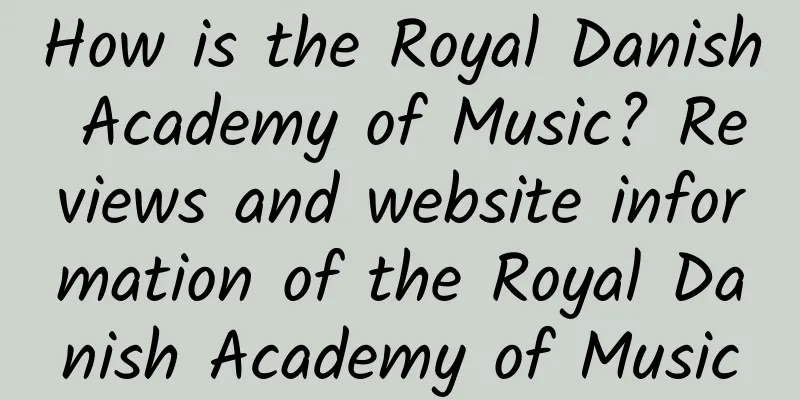How is the Royal Danish Academy of Music? Reviews and website information of the Royal Danish Academy of Music

|
What is the website of the Royal Danish Academy of Music? The Royal Danish Academy of Music (DKDM / RDAM; Det Kongelige Danske Musikkonservatorium) is the largest and oldest music academy in Denmark. It was founded by Giuseppe Siboni in 1825 and rebuilt by Nils Gaard in 1867. It has trained a large number of outstanding educational musicians, singers, music educators, church musicians, composers and performers, such as Vaughan Holmboe and Pearl Nargold. It mainly provides undergraduate and master's professional courses, as well as some diploma training courses. Website: www.dkdm.dk The Royal Danish Academy of Music (Det Kongelige Danske Musikkonservatorium, DKDM or RDAM) is the largest and oldest music academy in Denmark. Since its founding by Giuseppe Siboni in 1825, it has been the core institution of music education in Denmark. The academy was rebuilt in 1867 by the famous composer Niels Gade, further consolidating its position in the field of music education. As a symbol of Danish music culture, the Royal Danish Academy of Music has not only trained a large number of outstanding musicians, but also profoundly influenced the development of music in Denmark and even the world. Historical backgroundThe history of the Royal Danish Academy of Music can be traced back to the early 19th century. In 1825, Italian composer and singer Giuseppe Siboni founded the academy in Copenhagen. At that time, Denmark was in a period of cultural renaissance, and music, as an important part of art, received widespread attention from all walks of life. Siboni's vision was to improve the level of music in Denmark through systematic music education and provide professional training opportunities for young musicians. However, the early development of the academy was not smooth sailing. Due to funding shortages and management problems, the academy fell into trouble after Siboni's death. It was not until 1867 that the famous Danish composer Niels Gaard took over the academy and carried out a comprehensive reform, which brought it back to life. Gaard not only introduced modern music education concepts to the academy, but also attracted many outstanding musicians and educators to join, laying a solid foundation for the academy. Academy Mission and VisionThe mission of the Royal Danish Academy of Music is to cultivate music talents with creativity, professionalism and international vision through high-quality music education. The academy is committed to providing students with comprehensive music training, covering classical music, contemporary music, jazz, pop music and other fields. At the same time, the academy also focuses on cultivating students' critical thinking and innovative abilities, and encourages them to explore new possibilities in music creation and performance. The academy's vision is to become a leading music education institution in the world, promote the development of music art, and make positive contributions to social culture. To this end, the academy not only focuses on improving teaching quality, but also actively participates in international exchanges and cooperation, and has established extensive cooperative relations with higher music colleges around the world. CoursesThe Royal Danish Academy of Music offers undergraduate, master's and diploma training courses, covering a variety of professional fields such as music performance, composition, music education, church music, etc. The following is a detailed introduction to the academy's main courses: Undergraduate coursesThe undergraduate program aims to provide students with a solid foundation in music theory and superb performance skills. Students can choose from the following majors:
Master's ProgramsThe master's program focuses on cultivating students' professional depth and research ability. Students can choose the following majors:
Diploma training coursesThe diploma training courses provide short-term training opportunities for students who want to further improve their professional skills, covering a variety of fields such as music performance, composition, music education, etc. The course content is flexible and diverse, and students can choose suitable courses according to their interests and needs. FacultyThe Royal Danish Academy of Music has a high-level teaching staff, including many internationally renowned musicians and educators. The teachers of the academy are not only experienced in teaching, but also have made outstanding achievements in music creation, performance and research. They help students discover their potential and achieve their career goals through personalized teaching methods. In addition, the college regularly invites music masters from all over the world to hold master classes and lectures, providing students with opportunities to communicate with top international musicians. International Cooperation and ExchangeThe Royal Danish Academy of Music attaches great importance to international cooperation and exchanges, and has established long-term cooperative relations with many higher music schools around the world. The students and teachers of the academy can participate in international music activities through exchange programs, joint performances, academic seminars and other forms to broaden their horizons and improve their professional level. For example, the college works closely with the Association of European Conservatories (AEC) and actively participates in music education projects across Europe. In addition, the college has established partnerships with many music schools in Asia, America and Africa to promote cross-cultural music exchanges. Alumni achievementsAlumni of the Royal Danish Academy of Music have achieved outstanding achievements in the field of music and have earned the academy an international reputation. The following are some of the famous alumni:
The success of these alumni not only demonstrates the quality of the college's education, but also sets an example for young musicians. Campus FacilitiesThe Royal Danish Academy of Music has first-class campus facilities, providing students with a good learning and performance environment. The academy has multiple concert halls, recording studios, rehearsal rooms and libraries to meet the learning needs of students in different majors.
Admissions and ApplicationThe Royal Danish Academy of Music has a strict and transparent admissions process, aiming to select students with musical talent and potential. Applicants need to demonstrate their musical talent and professionalism through auditions and interviews. The academy also provides detailed admissions guidelines and consulting services to help applicants complete the application process smoothly. In addition, the college provides comprehensive support services for international students, including language training, accommodation arrangements and cultural adaptation guidance, to ensure that their study and life in Denmark are smooth and enjoyable. Future OutlookLooking to the future, the Royal Danish Academy of Music will continue to uphold its fine traditions, constantly innovate educational models and improve teaching quality. The academy plans to further strengthen cooperation with international music schools to promote the development of global music education. At the same time, the academy will also increase research efforts in emerging music fields, explore the integration of music with technology, culture and society, and inject new vitality into the future of music art. In short, as a treasure of Danish music education, the Royal Danish Academy of Music will continue to cultivate more outstanding music talents for the world and make greater contributions to the development of music art. For more information, please visit the official website of the Royal Danish Academy of Music: www.dkdm.dk. |
Recommend
How to make casserole stew How to make casserole stew
Casserole stews have a rich flavor and are good a...
The efficacy of red dates and black fungus soup
Many people like to drink some health-preserving ...
The efficacy and function of Chinese medicine carambola root
Have you ever seen the Chinese medicine carambola...
The efficacy and function of almonds
I heard that almonds are a kind of longevity frui...
How to make ground mushrooms delicious
Ground mushroom is a kind of mushroom that grows ...
Four benefits of eating bananas for men Introduction to the benefits of eating bananas for men
Many men are not very interested in fruits, and t...
How is Chubb Insurance Group? Reviews and website information of Chubb Insurance Group
What is the website of American Chubb Insurance Gr...
Nutritional value of domestic red grapes
Speaking of red grapes, many people will think of...
Common cold dishes recipes
Cold dishes are very popular because they are eas...
Benefits of Black Oatmeal
How many friends know the effects and functions o...
Side effects of eating coriander and taboos of eating coriander
Coriander is a green leaf vegetable with a natura...
The difference between morning glory and cup flower
There are many similar wild plants growing in nat...
Crispy roasted eggplant method steps Crispy roasted eggplant method
Today I will tell you about a Northeastern dish, ...
What can't be eaten with bananas?
common sense As the saying goes, "Medicine a...
How is the Zambian Embassy in China? Reviews and website information of the Zambian Embassy in China
What is the website of the Zambia Embassy in Beiji...









